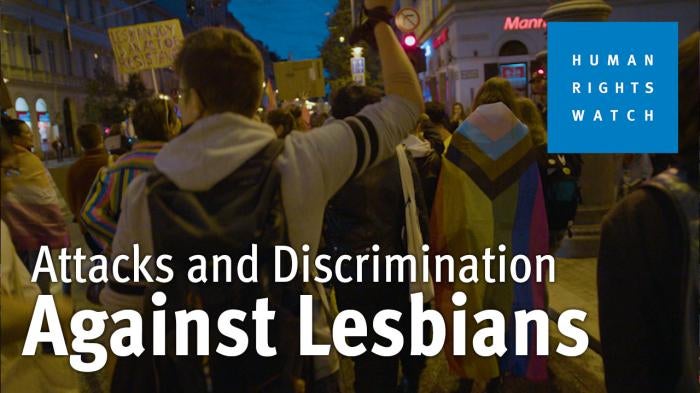Lesbian, bisexual, and queer (LBQ+) women and non-binary people around the world face violence from security forces, family members, and others, along with widespread discrimination that prevents them from building relationships, homes, and families, Human Rights Watch said in a report released today.
The 211-page report, “‘This Is Why We Became Activists’: Violence Against Lesbian, Bisexual, and Queer Women and Non-Binary People,” is a groundbreaking investigation into violence and discrimination in 26 countries. Human Rights Watch looked beyond the criminalization of same-sex conduct to analyze how sexist, patriarchal legal regimes such as male guardianship, unequal inheritance laws, and discrimination against single women violate LBQ+ people’s rights and leave them at a significant disadvantage in virtually every aspect of their lives. In addition to physical and sexual violence from family members, security forces, and others, LBQ+ people face discrimination at work, in land and property rights, fertility services, migration and resettlement, and unequal access to justice.
“Lesbian, bisexual and queer women are renowned for leading human rights struggles around the world,” said Erin Kilbride, LGBT rights and women’s rights researcher at Human Rights Watch and author of the report. “But the scale of brutal violence, legal discrimination, and sexualized harassment these communities face is rarely documented.”
The report was motivated by the severe lack of research and policy that focuses specifically on the rights of LBQ+ people and the immense need to support the work of LBQ+ activists. Human Rights Watch interviewed 66 LBQ+ people for the report, most of them human rights defenders working at the local or national level.
Human Rights Watch identified 10 key areas of rights abuses for which there is immediate need for research, funding, and policy reform. These include forced and coerced marriage to men; labor rights and sexual violence at work; violence by security forces against masculine-presenting women; unequal property, inheritance, and land rights; legal restrictions on women’s movement and violent attacks on LBQ+ couples in public; parental rights and access to fertility treatment; access to sexual, reproductive, and mental health services; sexual assault and follow-up care; barriers to asylum; access to justice; and attacks against LBQ+ human rights defenders.
According to World Bank data, in 40 percent of countries worldwide, women do not have equal access to own, rent, administer, or inherit property. This presents an often insurmountable economic and legal barrier to LBQ+ couples, Human Rights Watch found. Legal regimes that require women to obtain a male guardian’s permission to rent an apartment, or that prioritize sons in land inheritance, often mean that neither partner in an LBQ+ relationship can rent, own, or inherit a home.
Violations of women’s property rights often require LBQ+ women to marry men in order to have access to land and property, contributing to coercive marriage practices, and prevent LBQ+ people who divorce their husbands or become widows from starting new, financially viable LBQ+ relationships later in life. An LBQ+ activist in Kyrgyzstan who was forced to marry a man at age 19 told Human Rights Watch, “There is no path to freedom if you don’t get married [to a man].”
Many people interviewed said that masculine-presenting LBQ+ people faced a lifetime of economic marginalization, discrimination and harassment at work, psychological abuse, as well as targeting by security forces, and physical and sexual violence. LBQ+ activists in Argentina, El Salvador, and Kyrgyzstan said that masculine-presenting LBQ+ people in their communities were often forced into precarious work with poor labor rights practices (farm work, sex work, and auto shops, respectively) or male-dominated fields, where they face physical and sexual abuse.
“Many of us become sex workers [due to hiring discrimination in other fields],” a lesbian and sex worker rights defender in El Salvador said. “But then when police raid brothels and homes, the masculine lesbians get treated ‘like men.’ This means more forceful handcuffing, kneeling, and stripping their shirts off.”
Attacks on more feminine-presenting LBQ+ individuals and couples in public also cause them to limit their movements. Human Rights Watch compiled accounts of LBQ+ couples murdered, raped, or brutally attacked. This violence forces LBQ+ women to “self-police” their movements, Human Rights Watch found, from fear of leaving the house with their partner.
Impunity for violent crimes against LBQ+ people is rampant. In April 2022, a 25-year-old non-binary lesbian, Sheila Adhiambo Lumumba, was found naked and murdered in their bedroom in Karatina, north of Nairobi. A postmortem examination seen by Human Rights Watch revealed that Lumumba was sexually assaulted, hit on the head with a blunt object, and stabbed in the chest, face, neck, and eyes. For weeks after the murder, Kenyan police failed to properly investigate the case, leaving Sheila’s friends and family to collect evidence and CCTV footage.
Government authorities should conduct thorough, transparent investigations into reports of violence against LBQ+ individuals and couples, and develop laws, policies, and protocols that explicitly protect the rights of LBQ+ women and non-binary people. Authorities should also reform patriarchal systems of control, including male guardianship laws, policies, and practices; discriminatory property and inheritance laws; and other restrictions on women’s autonomy, movement, and freedom that limit LBQ+ enjoyment of more traditionally conceptualized LGBT rights, such as marriage equality or the decriminalization of same-sex conduct.
Donors should fund LBQ+-led movements for land, environmental, Indigenous peoples’, migrant, and disability rights, as well as organizations and collectives working specifically for LBQ+ rights. They should also fund research into LBQ+ economic marginalization and research that specifically addresses how fundamental restrictions on women’s autonomy impact LBQ+ women in uniquely violent ways.
“LBQ+ activists are experts in the violence their communities experience,” Kilbride said. “With this report, we provide governments and donors with concrete steps for action, starting with visibility, funding, and protection for LBQ+ movements.







